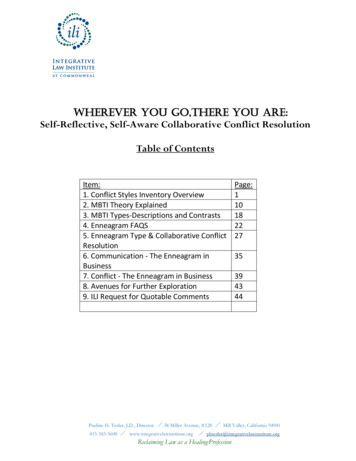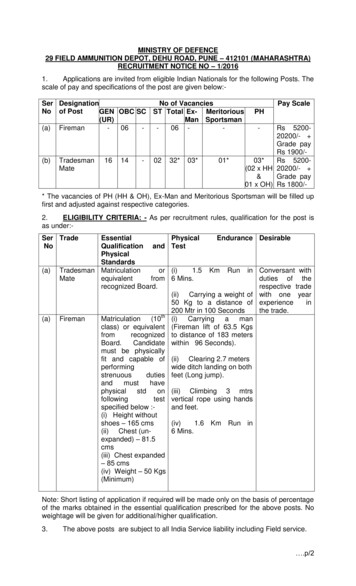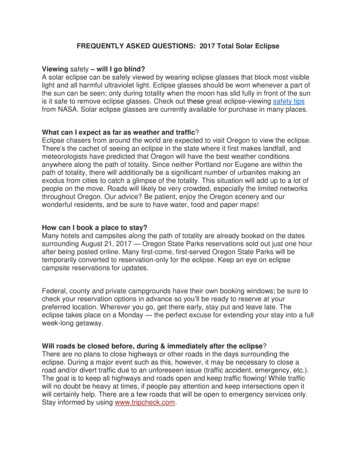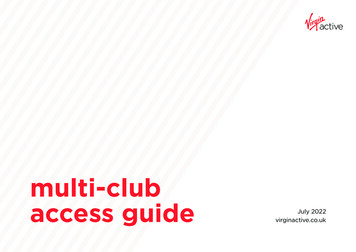
Transcription
WHEREVER YOU GO,THERE YOU ARE:Self-Reflective, Self-Aware Collaborative Conflict ResolutionTable of ContentsItem:1. Conflict Styles Inventory Overview2. MBTI Theory Explained3. MBTI Types-Descriptions and Contrasts4. Enneagram FAQS5. Enneagram Type & Collaborative ConflictResolution6. Communication - The Enneagram inBusiness7. Conflict - The Enneagram in Business8. Avenues for Further Exploration9. ILI Request for Quotable CommentsPauline H. Tesler, J.D., Director415-383-5600 38 Miller Avenue, #128www.integrativelawinstitute.org Page:11018222735394344Mill Valley, California g Law as a Healing Profession
Handouts for Workshop on Conflict StylesMATTERSTMcom1High Focus on AgendaDIRECTINGCOOPERATINGFocus on own agenda: HighFocus on relationship: LowFocus on own agenda: HighFocus on relationship: HighI win/you lose.I win/you win.“My preference is. And please tellLow focus onCOMPROMISINGHigh focus onRelationshipFocus on own agenda: MediumFocus on relationship: MediumRelationshipI win some/you win some.AVOIDINGHARMONIZINGFocus on own agenda: LowFocus on relationship: LowFocus on own agenda: LowFocus on relationship: HighI lose/ you lose.I lose/you win.Low Focus on Agenda1
prelationshipI win and you lose.I win and you win.Strategies: Persuade, insist, demand andStrategies: Assert self and invite other views.repeat, compete, control, refuse to negotiate,attack. As leader, discourage challenges,and weaknesses of all views.cite policy, set limits and consequences, instruct.seeking and evaluating additional information.Source of power: From position, role, control ofSource of power: From trust, skill, ability,resources, ability to impose consequences.coordination, goodwill, creativity, mutuality.Cooperate inBenefits: Speed, decisiveness, gaining or: Trust and mutuality. High potential forprotecting things important to the Director. Useful increativity and personal growth. Others blossomemergencies - no time lost negotiating duties whenand develop new gifts. This style has immensethe ship is sinking. Stability under unswervingrewards of satisfaction, energy and joy whenleadership.successfully used on meaningful issues.Costs when over-used: Inequality, resentment,Costs when over-used: Fatigue and time loss,reduction in trust, loss of cooperation. In time,distraction from more important tasks, analysisothers display lower self-motivation, atrophy ofparalysis. Used for many trivial issues, peoplegifts, diminished self-respect, or depression.weary of "too much processing".Reduced emotional and spiritual growth in thewithout attention to the skills and time required,AttemptedDirector if others fear to challenge them.2
MATTERSTMcomCOMPROMISING3AVOIDINGand mediumandfocus on relationshiprelationshipI win some and you win some.I lose and you lose.Strategies: Urge moderation, bargain, split theStrategies: Withdraw, delay or avoid response.Divertattention,suppressemotions,bemeet them halfway, give a little and take a little.inaccessible or inscrutable.Source of power: From moderation, sense ofSource of power: From calmness, silence, non-fairness, practicality, and pragmatism.cooperation, being unavailable or “above it all.”: Relatively fast, provides a way out: Freedom from entanglement in trivialof stalemate, enables the show to go on.Emphasis on fairness is readily understood bymost people. Builds atmosphere of cooperation.block others without seeming negative.CostsandCosts when over-used: Periodic explosions ofunprincipledpent-up anger, “long stretches of cottony silenceagreements, likelihood of patching symptomspunctuated by terrifying explosions,” slowand ignoring causes. Everyone gets a little, butdeath of relationships, residue of bad feeling.no one is really happy. Too-quick compromisesStagnation, dullness, declining interest andmay short-circuit needed in-depth discussion.energy. Loss of engagement and Mediocrityof3
MATTERSTMcom4Principles to Remember1.HARMONIZINGhuman.andMost people function better inrelationshipof life.2. Self management is the most importantYou win and I lose.Strategies: Agree, support, acknowledge error,3. Self-awarenessgive in, convince self it’s no big deal, placate,preferences and the strengths and dangerssmile and say yes, grin and bear it.of your preferred styles is a big step towardsself-management.Source of power: From relationships, approval4.No style is: Flexible and easy to work with, winsapproval and appreciation of others, creates5.pleasant atmosphere. Freedom from hassle, atof preferences for how to interact (pagesleast in the short-term.7-9).7-9). Taking steps to meet these frees upCosts when over-used: Frustration for others.6. No matter how aware or skillful you are,Resentment, depression, and stunted growth ofyou will still get hurt or fail sometimes.personal gifts in the Harmonizer. Dependency onWe're human, not gods.who want the engagement ofLearn frommistakes, make right what you can, forgiveif the Harmonizer accepts unhealthy patterns orwhen you are able, get on with things. Livebehaviors that ought to be challenged.fully, not perfectly.4
MATTERSTMcom5styles skillfully as needed. However, most people rely on one or two preferred styles and use themunthinkingly in allchoices about which style is best in a given situation or moment.Directingpresence of someone who chronicallyMost useful when:directsan emergency loomsself-respect of others is diminishedthere is no time for give-and-takeneedlesslydiscussionyou are sure you’re right, and being rightmatters more than preserving relationshipsthe issue is trivial and others don’t reallycare what happensweaker parties need to be protected fromCooperatingMost useful when:the issues and relationships are bothlong-term ability to work together isimportantstronger onesa creative outcome is importantprinciples are at stake and must not betime and energy are available forcompromised, regardless of costdiscussionreasonable hope exists to meet allLeast useful when:has not yet been attemptedsupport and cooperation of others whowant to be treated as equals is importantconcernsLeast useful when:time is shortthe issues are trivialyou’re overloaded with “processing”either get annoyed and resistant or fallthe goals of the other person are wronginto passiveness and dependency in thebeyond doubt5
MATTERSTMcom6Compromisingthe relationshipMost useful when:used habitually for most issues (leads togetting a quick settlement matters more“explosions” or “freeze-out”)than exploring all possible options.a residue of negative feelings is likely toworking together is important, but time orlingerresources to Cooperate fully are limitedwhen settling on some solution, even ifconfrontationless than ideal, is better than a completeyour role or duties oblige you to take a standstalemate(even though you may personally prefer towhen efforts to Cooperate will beAvoid or Harmonize)misunderstood asLeast useful when:HarmonizingMost useful when:creative solution possible is essential (useinstead)keeping others happy is the most importantgoalwhen you can’t live with the consequencesexpressing your wishes may bringof getting less than what you want or needretaliation from others and you have nodeep principles or values are at stakemeans to protect yourselfAvoidingMost useful when:the issue is trivialtime to talk is limited and a decision can beyou really don’t care about the issueyou are powerless and have no wish toblock the other personLeast useful when:delayed for nowyou are likely to harbor resentmentyou have little power to openly resist anused habitually in order to win acceptanceopponent but you don’t want to actively goby others (outcome: lack of self-respectalong with their wishesand personal growth in you and eventuallyperhaps depression)Least useful when:you care about both the issues involved andothers wish to Cooperate and will feel likeDirectors if you Harmonize6
MATTERSTMcom7Strategies for Working with Styles of OthersYou can do a lot to help people with styles different from your own feel more comfortable inpeople who live or work with you. If you talk when things are calm about your styles and whatstrangers, and you will know how to respond in situations that previously confounded you.How to bring out the best in someonewho scores high in DirectingDirectors usually prefer to deal with thingsPeople who use the Directing style a lotor passive. Don’t withdraw without givingare often task oriented. They are usuallysome clue about your intentions. Lack ofquite productive and concerned to get theinformation about this will increase theirjob done. Engage them and let them knowanxiety and anger.you are committed to the task at hand orA Directing person who is angry can beresolving the issue satisfactorily.If youquite intimidating, for this style is the mostneed time to think things through or coolactive, and “in your face” when anger is high.and get anxious when others are silentIf this person has a history of abusing othersyou ask, so long as you indicate clearly aemotionally or otherwise and holds morecommitment to returning to resolve things.power than you, look for a path to safety orYou will get a more positive response ifshelter.If the person is basically healthyemotionally, simply asking for a chance toback (e.g., in an hour, or tomorrow at ninecool off and think often helps, so long aso’clock, etc).you state clearly your intention to return andThough their task focus makes it easy towork on things.forget the feelings and needs of others,many Directors feel deeply responsible forthose around them and may feel quite badif they realize they have wounded others.Look for ways to engage them about theneeds of others in settings where they arenot in the middle of a big job.How to bring out the best in someonewho scores high in CooperatingFeeling heard helps all styles, but Cooperatorsrespond particularly well to efforts to structureconversation around listening. Hear them outfully and you are likely to be surprised at how7
MATTERSTMcom8well they listen to you in return.Most Cooperators value directness andAvoiders know – in thoughtful tones - whatcandor, so long as you are polite. Sayingyou want and that you’d like them to thinkwhat you want and need will be appreciated,about it. Then come back later – an hour, aparticularly if you manage to say it in an attitudeday, a week - and hear their response.of “providing information about what mattersStay low-key. The more intense or demandingmost to me” rather than criticizing or makingyou are, the more likely the Avoider will godemands.into major withdrawal.If you are a Harmonizer or Avoider, resistthe temptation to back off from an assertiveAvoiders who are actually quite task focused,Cooperator. Yes, Cooperators do speakbut in a particular way. They bring a highout, but they truly want to hear your viewslevel of caution and attention to detail totoo. If you are silent or too quick to agree, theCooperator ends up feeling like a Director,to put important things at risk. These Avoiderswhich is not at all the intention.need data and information, presented in a calmBring a blend of task and relationship focusand methodical way, in order to comfortablyenter negotiations. Look for ways to provideLike the directing style, Cooperatorsthem with relevant details, about plans, options,particularly appreciate information about whatcosts, rules, precedents from elsewhere,is going on, and tend to become anxious orexpected results, how surprises will be dealtupset if others pull away without signallingwith, etc. If possible, give them time to absorbtheir intentions. Don’t withdraw without givingthis information before expecting them toa clear explanation, such as, “I want to gonegotiate. See two-step approach above.for a walk for half an hour to think thingsHaste in decision making tends to pushthrough. Then I’ll come back and we can talkAvoiders into withdrawal or analysis paralysis.some more.”Move slowly, one step at a time.How to bring out the best in someone whoscores high in AvoidingHow to bring out the best in someone whoscores high in CompromisingAvoidersCompromisers have a strong sense offrom an offer to give them time and/or spacereciprocity.to withdraw and think things through. Youare likely to respond in kind if you back offare more likely to get a “yes” answer aboutsomewhat from your initial position. Leaveanything you need from them if you use aroom to negotiate when you make yourMore than other styles, they8
MATTERSTMcom9opening request.You will get more cooperativeness in doingCompromisers value fairness andserious work with Harmonizers if you use amoderation. Address them in these terms.two-step approach. First, connect at a humanFor example, use terms like "being fair", “fairlevel (ask how they are doing, inquire aboutplay”, “reasonable”, “you give some, I givea family member, tease a little, complimentsome”, “give and take”, etc.them, thank them for something, etc.). Then,Compromisersand only then, settle down to business. Thehuman connection always comes beforethrough to a practical solution that ends thework for Harmonizers (an insight that isDirectorsdeal was achieved probably matters morethan talking through all options.Compromisers do not enjoy prolongeddebate. A determined partner in Directingor even Cooperating style may, with stronglogic, be able to persuade them that they arewrong, creating an appearance that the moreforceful person has "won".However, theto remember).Stay light. Seriousness or heaviness in othersquickly stirs anxiety in Harmonizers andmakes it hard for them to focus or stay ontask. Use humor. Appreciate the relationshipor their good qualities out loud if you canhonestly do so.victory may be hollow. The Compromiser’sAssure them repeatedly that you really wantdeep inner sense that conclusions should beto know their preferences and views. Thankreciprocal and balanced will be disturbed.them sincerely if they do level with you. If theyTrust, openness and cooperativeness willbring criticism, thank them generously, for itsuffer in the long-term.requires great effort for Harmonizers to beFind concessionsfor the Compromiser, even if you are sureyour argument is stronger.direct about anything negative.In meetings or extended conversations withHarmonizers, take breaks and lighten upHow to bring out the best in someone whoscores high in HarmonizingHarmonizers want to please and be pleased.Pay attention to small social niceties. More thanon a regular basis. Long, heavy discussionunsettles Harmonizers and pushes themto unhelpful places more quickly thanother styles.any other style, Harmonizers will be positivelyaffected by gestures of thoughtfulness – aa chocolate bar, a card, etc.9
(https://www.CareerPlanner.com)Career Testing Since 1997(https://www.CareerPlanner.com)Cognitive Functions Explained In Simple TermsBy Michael T. Robinson )FounderCareerPlanner.com Inc.NiNeSiSeTiTeFiFe(Introverted- (Extraverted- (Introverted- (Extraverted- (Introverted- (Extraverted- (Introverted- (ExtravertedIntuiting.cfm) Intuiting.cfm) Sensing.cfm) Sensing.cfm) Thinking.cfm) Thinking.cfm) Feeling.cfm) ined.cfm)Cognitive Functions Chart - Shows Which of Your Functions are Strongest. ionsChart.cfm)This article describes your 8 cognitive functions, as well as what introversion and extraversion are. These concepts form the basis forunderstanding and using Personality Type.The Brain and Your Personality TypeThe brain takes in information for us (perceiving) and then it helps us make decisions (judging).These are the 2 most basic, fundamental functions of the the brain, besides keeping us alive by telling us to eat and breathe.There are 4 totally different ways of perceiving and 4 totally different ways of judging.Together these are called the 8 cognitive functions.The differences in how we all perceive and judge accounts for the basic differences in personality. To a large extent, differences inperceiving and judging is why we are all so different.Personality type theory actually comes from an understanding of these 8 functions. Your 4 letter personality type is actually a codewhich will tell you which functions you are strongest in and which functions are probably weak and which will cause you all sorts ofproblems.Unfortunately, you can not be good at using all 8 of these functions.You will probably be very good with 2 of these cognitive functions and they will account for your strengths. 2 functions will be weak andwill indicate what your blind spots might be.And, just to make things interesting, 4 of the 8 functions will be in the unconscious and out of your control. These "shadow functions"will usually pop up to cause you trouble when you are stressed.Why Bother Learning This and Who Cares?Understanding a bit about cognitive functions and personality type will give you a framework for understanding yourself and otherpeople.So if you want better relationships at home or at work, personality type will give you a method for understanding people and foradjusting your approach with people, especially the difficult people in your life.It takes some practice. But once you understand the basics of personality type, and you see a person behaving in a certain way, thesystem will tell you why they behave that way and what you might do about it.The best way to learn about personality type is to start with the cognitive functions, described below.But First Lets Look at Introversion and Extraversion10
Introversion and extraversion are known as "attitudes" and they affect the functions.Almost everyone has heard the term "extravert" and "introvert."Carl Jung, the Swiss Psychoanalyst was the first to define these terms.Extraverts are those people who talk a bit more, talk a bit louder, talk a bit faster and seem to enjoy having more people around andhaving more action in their lives.The definition of an extravert is someone who gets energized by having more activity in the real world. More people, more events, moresounds, more sights etc.Introverts are those people who are more energized by being in their heads, with their own thoughts, ideas, dreams, visions etc.Introverts prefer quiet. They talk less. They talk more slowly, unless they are talking about their favorite subjects in which case they canlook like extraverts.There are two worlds we all live in. The world inside of our mind which is where introverts prefer to spend most of their time, and theworld external to our minds. That would be the real, physical world full of action, people, and events. It's the external world whereextraverts prefer to spend most of their time.There is a scientific reason for extraversion and introversion (./MB2/Personality-Type-Theory-and-Evidence.cfm), and it's a bitsurprising. Researchers have found that due to brain chemistry, introverts normally have a higher level of neuro chemical stimulationgoing on in their brains. Thus, they are normally over stimulated and they try to tone things down.Extraverts have less neuro chemical stimulation going on in parts of their brains, thus they seek out more stimulation from the externalworld.The key to remember is that when you think of the term "extraverted" think of what is going on in the real world, around you, and in thepresent. It's always in the present moment.When you think of "introverted" think of what is going on inside one's mind, and this activity can involve the past, present and future.An extreme example of a person who prefers extraversion is someone who loves to go to live sporting events like baseball games orfootball games, or rock concerts. I'm not talking about the person who goes once a year. I'm talking about the person who has seasontickets and tries to get to as many games as possible. They are energized by the crowds, the game, the event as a whole. Then afterthe event, they probably want even more excitement. They will want to continue to hang out with their friends.There are still introverts in the crowd, but, after all of that external stimulation, they will want to go home and recharge in a quietenvironment.Introverts still want and need people, it's just that they like for their people interactions to be a little less noisy, less crowded and lesschaotic. They prefer being with one or two close friends rather than larger groups. The reason is that they are neuro chemically moresensitive.The Perceiving FunctionsThe 4 ways to take in information are:Extraverted Sensing (Se) (Extraverted-Sensing.cfm)Introverted Sensing (Si) (Introverted-Sensing.cfm)Extraverted Intuiting (Ne) (Extraverted-Intuiting.cfm)Introverted Intuiting (Ni) (Introverted-Intuiting.cfm)Remember, when you hear the word "extraverted" that means what happens external to your mind. This means what happens in thereal physical world. Also remember it takes place in the present moment, real time.When you hear the word "introverted" that means what goes on inside your mind. That would be your thoughts, feelings, ideas,concepts, theories, and memories. These transcend time. They can be about the past, present, or future.Extraverted Sensing is what happens when you pay attention to what your 5 senses (touch, taste, smell, hearing, seeing) are tellingyou about the real world. It's a real time process that is happening now.So if you pay attention to a sound coming from a bird just outside your door, that's your brain using it's extraverted sensing function topay attention to the sound.11
Introverted Sensing is when you remember the sound of a bird that you heard last week. Because you are paying attention to thememory of it in your mind, rather than the real live event.Extraverted Intuiting is when you see several possible futures. It's when you do rapid fire brainstorm. It's when you see connectionsand patterns between people and events.Introverted Intuiting is when you get insights that seem to come from nowhere. It's when you have those "aha" moments.The Judging FunctionsThere are the 4 basic ways we make decisions. These are your judging functions:Extraverted Thinking (Te) (Extraverted-Thinking.cfm)Extraverted Feeling (Fe) (Extraverted-Feeling.cfm)Introverted Thinking (Ti) (Introverted-Thinking.cfm)Introverted Feeling (Fi) (Introverted-Feeling.cfm)Extraverted Thinking is making decisions about the external world using objective facts.Extraverted Feeling is making decisions based on a value system that is concerned with the well being of people. These values aremore global and cultural than personal.Introverted Thinking is making decisions based on data, categories, and theories inside your mind.Introverted Feeling is about making decisions based on your personal values and being concerned more with how things impact youpersonally than how the group is impacted.Understanding the Order of Your 8 FunctionsAlthough we all have 8 functions, our ability to use them is different for each of the 16 personality typesThere are two ways to list your 8 functions, by order of strength as measured by a cognitive function assessment, or by using what isknown as the John Beebe1 Model or Hierarchy.John Beebe is one of the foremost Jungian Analysts in the world today and he has taken Jung's personality type to the next level.Each cognitive function behaves different depending on which position / role it falls into in the Beebe Hierarchy.The IntrovertsRoleISTJISFJINFJINTJISTPINTPISFPINFP1 Dominant / HeroSiSiNiNiTiTiFiFi2 Auxiliary / Good ParentTeFeFeTeSeNeSeNe3 Relief / Eternal ChildFiTiTiFiNiSiNiSi4 Aspirational / Soul / SpiritNeNeSeSeFeFeTeTe5 OpposingSeSeNeNeTeTeFeFe6 Critical ParentTiFiFiTiSiNiSiNi7 TricksterFeTeTeFeNeSeNeSe8 Devilish / FeThe ExtravertsRoleESTP ESFP ENFP1 Dominant / HeroSeSeNeNeTeTeFe2 Auxiliary / Good ParentTiFiFiTiSiNiSiNi3 Relief / Eternal ChildFeTeTeFeNeSeNeSe4 Aspirational / Soul / SpiritNiNiSiSiFiFiTiTi5 OpposingSiSiNiNiTiTiFiFi6 Critical ParentTeFeFeTeSeNeSeNe7 TricksterFiTiTiFiNiSiNiSi8 Devilish / TransformativeNeNeSeSeFeFeTeTeUnderstanding the Roles (Archetypes)12
We all play different roles in life. Sometimes father, mother, child, brother, sister, teacher, student. Your functions have 8 different rolesto play.Function 1) Hero / Heroine RoleYour strongest function will be in the hero / heroine role. This is how you "save the day." This is your dominant cognitive function.When life calls on you to save the day, you will call on, and depend on your dominant function.If you look at your life, at a time that you made the most progress, or you did something really significant, where you had to work hard atit, but you succeeded, it was your hero function doing the heavy lifting and saving the day for you.Function 2) Auxiliary / Supportive / Parent RoleThis is your second strongest function. It supports your Hero function. It's helpful to think that together the first two functions account for 90% of your personality.It's called the "Parent" function because it's used in a helping, positive, supportive way.According to John Beebe, the Jungian Analyst who expanded Carl Jung's work of the 8 function model, when you reach out to helpsomeone, it's your second function that you start with.Function 3) Tertiary / Relief Role / Eternal ChildWhichever function falls into the 3rd position, the "Relief Role," will be the one that is almost always weak and troublesome.It does not develop until mid life. Because of this it gets very little exercise and very little practice. Thus if you are called to use thisfunction in your teens or mid twenties, you will fall flat on your face.You won't be able to count on this function as you do your top two functions.Psychologists suggest that you should get to know your tertiary function in a relaxed, playful, recreational, stress free manner. Thus it'scalled the "Relief" function.Function 4) Inferior / Aspirational RoleWhichever function falls into the 4th position, will also be weak for you but it holds something special as the name "Aspirational"indicates.Whichever function falls here, describes what you aspire to.Yes, early on in life, using your 4th function is a source of weakness, maybe failure, maybe even shame. You probably can not performthe skills and tasks that are normally associated with this function.But you will find great satisfaction and maybe even breakthroughs, from periodically trying to exercise this function.In particular, the 4th function is considered the doorway to the unconscious. It's through using this function in a low pressure, low stress,friendly way that you can tap into the unconscious and all the energy and creativity that is stored there.So make sure you keeping trying to use your 4th function. It will help you become all you can be.Function 5) Opposing RoleYour 5th function is used mainly as a defense. It's how you might become stubborn, uncooperative, unfriendly, rude, or obstructive.So look at the fifth function for your 4 letter type. See what it is all about, and ask yourself if that is not how you become defensive,stubborn etc.Function 6) Critical Parent RoleWe all have experienced a critical parent in our lives. It's when a parent tells you that you are doing something wrong or you are doingsomething poorly.The critical parent is a voice in your head that will cause you to criticize yourself and others.Whichever function falls into this position will determine the flavor of your self criticism.Function 7) The Trickster RoleWhich ever function falls into the 7th position will cause you grief throughout your life.The role of the trickster is to deceive and distort what you experience, or think you experience.Mike Shur the Assessment Specialist and personality type expert describes the 7th function as walking through the fun house at acarnival. This is the room full of mirrors that stretch you and distort you, making you taller and thinner than you really are.13
You will most often experience the 7th function when you are stressed or under pressure, or overly tired. You can not trust yourperceptions or judgments when your 7th function is in charge.You will see things and believe things that are not real. You will put yourself or others in a double bind situation, which forces people tolose.People describe it as being in the grip of their 7th function.Function 8) Demonic / Transformative RoleWhich ever function falls into the 8th position describes how you are when you are the most destructive. Thus the term "Demonic Role."The 8th function can also be transformative, propelling you to greater personal growth and maturity.But most often, when a situation calls for you to use your 8th function, it's not going to be pretty.Your Strengths, Weaknesses and Blind SpotsThe strongest function is called your dominant function and it usually is well developed by age 13.The second strongest function is called your auxiliary / supportive function. It supports your dominant function. It usually develops byage 21.Together your dominant and auxiliary function probably describe 90% of your personality type, on a good day. So you almost don't needto know about the other 6 functions.Except that knowing those other 6 functions will show you where you are the weakest, where you have blind spots, and where you willexperience the most personal growth as an adult.Your 3rd function is known as your tertiary function. It's never going to be all that strong that you can depend on it, but you will probablyfind that activities that use your 3rd function will be very relaxing and recreational for you.Your 4th function is called your inferior function for a reason. It's a weak area for you. However, it also represents the area for maximumpersonal growth.The 4th function is said to be
WHEREVER YOU GO,THERE YOU ARE: Self-Reflective, Self-Aware Collaborative Conflict Resolution Table of Contents Item: Page: 1. Conflict Styles Inventory Overview 1 2. MBTI Theory Explained 10 3. MBTI Types-Descriptions and Contrasts 18 4. Enneagram FAQS 22 5. Enneagram Type & Collaborative Conflict Resolution 27 6. Communication - The Enneagram in










